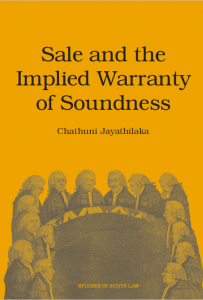By Dr Chathuni Jayathilaka and Prof Gwen Seabourne, Centre for Law and Historical Research (University of Bristol Law School)
 Although based in England, the Law School is home to experts on a variety of different jurisdictions – for example, Dr Chathuni Jayathilaka, who teaches contract, commercial comparative and Roman law is a specialist on Scots private law and Scots Legal History. She has recently published a monograph entitled Sale and the Implied Warranty of Soundness and here, she explains it to Gwen Seabourne of the Centre for Law and History Research.
Although based in England, the Law School is home to experts on a variety of different jurisdictions – for example, Dr Chathuni Jayathilaka, who teaches contract, commercial comparative and Roman law is a specialist on Scots private law and Scots Legal History. She has recently published a monograph entitled Sale and the Implied Warranty of Soundness and here, she explains it to Gwen Seabourne of the Centre for Law and History Research.
GS: So, Chathuni, tell us about your new book (with translation for common lawyers!). It’s about a topic in Scots private law, isn’t it?
CJ: Yes. Sale and the Implied Warranty of Soundness deals with an under-researched area of Scots law: the common law contract of sale. This contract, which still regulates transactions featuring real property (i.e. land) and intangible property, has been subjected to little analysis in the past two centuries. The last book on this topic, Mungo Brown’s A Treatise on the Law of Sale, was published almost 200 years ago, in 1821.
As a result, there are a number of gaps in knowledge in this area. One of the major issues is that the default rules which apply under the Scots common law contract of sale have never been coherently systematised. Another is that it is not clear whether the same default rules applied to all contracts of sale, regardless of whether the property involved was real, personal or intangible. Historically, a number of the default rules developed exclusively through case law featuring one type of property, and there is disagreement about whether such rules apply to transactions featuring other types of property. (more…)
